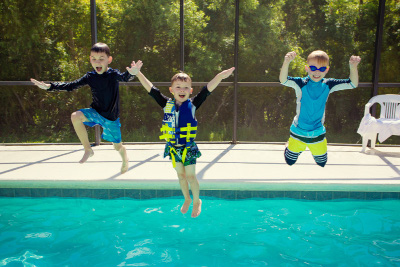Comparing Regular Chlorine Pools to Saltwater Pools: Which is Right for You?
Tue, Sep 24th, 2024
If you're considering installing a swimming pool or upgrading an existing one, one of the key decisions you'll face is whether to go with a traditional chlorine pool or a saltwater pool. Each type of pool has its benefits and drawbacks, and understanding these differences can help you make an informed choice that suits your needs and lifestyle.
How Traditional Chlorine Pools Work
A regular chlorine pool relies on adding chlorine directly into the water to keep it clean and free from bacteria, algae, and other harmful contaminants. Chlorine can be added in various forms, such as tablets, liquid, or granules, and it acts as a disinfectant to maintain water clarity and safety.
Pros of Traditional Chlorine Pools
1. Effective Sanitization: Chlorine is highly effective at killing bacteria and keeping the pool free of harmful microorganisms.
2. Immediate Impact: When added directly, chlorine immediately gets to work, making it easy to address issues like cloudy water or algae growth quickly.
3. Control: Pool owners have more direct control over the amount of chlorine and other chemicals, allowing them to adjust levels based on specific needs, such as after heavy usage or a storm.
Cons of Traditional Chlorine Pools
1. Chemical Handling: Chlorine requires careful handling and storage, as it can be hazardous if mishandled. It can irritate the skin, eyes, and respiratory system if not balanced correctly.
2. Ongoing Maintenance: Chlorine levels need to be monitored frequently, and additional chemicals like pH balancers or algaecides may be required to keep the pool in optimal condition.
3. Odor and Sensitivity: Chlorine has a distinct smell that some people find unpleasant, and it can cause skin irritation, particularly for those with sensitive skin or allergies.
How Saltwater Pools Work
Saltwater pools, while often thought of as chlorine-free, actually use a salt-chlorine generator to convert dissolved salt into chlorine. The difference lies in how the chlorine is produced and the resulting experience of swimming in the pool. A saltwater pool typically has a lower concentration of chlorine, making it gentler on the skin and eyes.
Pros of Saltwater Pools
1. Gentler on Skin and Eyes: The chlorine produced in a saltwater pool is less concentrated, making it feel softer and less harsh on the body. Swimmers often report less irritation in saltwater pools.
2. Lower Ongoing Maintenance: Saltwater pools require less frequent monitoring of chemical levels, as the salt-chlorine generator maintains a more consistent level of chlorine. This reduces the need for constant manual adjustments.
3. Softer Feel: Many people enjoy the feel of the water in a saltwater pool, describing it as smoother or silkier compared to traditional chlorine pools.
4. Cost Savings Over Time: Although the upfront cost of installing a saltwater system is higher, the reduced need for chlorine and other chemicals can result in savings over time.
Cons of Saltwater Pools
1. Higher Initial Costs: The equipment for a saltwater pool, particularly the salt-chlorine generator, tends to be more expensive to install compared to a traditional chlorine pool.
2. Complex Maintenance: While day-to-day chemical monitoring may be reduced, saltwater pools require specialized equipment and expertise to maintain the salt-chlorine generator and other components.
3. Corrosion Risk: Saltwater, over time, can cause corrosion to pool equipment, ladders, and even pool surfaces if not properly maintained. It's essential to use materials that are resistant to corrosion in a saltwater pool.
4. Electricity Usage: The salt-chlorine generator requires electricity to run, which can lead to higher energy costs, especially if it's used frequently.
Health and Comfort Considerations
Chlorine Pools
Traditional chlorine pools can be harsh on swimmers with sensitive skin, asthma, or allergies. The chlorine smell can linger on skin and hair, and high concentrations can cause red eyes or irritation after swimming. However, regular chlorine pools tend to be highly effective at maintaining crystal-clear water and a germ-free environment, making them a popular choice for both residential and public pools.
Saltwater Pools
Because of the lower chlorine levels, saltwater pools are much gentler on the skin, eyes, and respiratory system. Many people with sensitivities prefer saltwater pools for this reason. Additionally, the water in a saltwater pool tends to feel smoother, enhancing the swimming experience. Despite being gentler, the pool still maintains proper sanitization, but it requires ongoing equipment maintenance.
Cost Comparison
Upfront Costs
- Chlorine Pool: Traditional chlorine pools tend to have lower upfront installation costs since they don't require a salt-chlorine generator. However, ongoing costs can add up due to regular chemical purchases and maintenance.
- Saltwater Pool: The initial setup for a saltwater pool is more expensive because of the generator and specialized equipment required. This higher upfront cost can be a barrier for some, but the savings on chlorine and chemicals over time can offset the investment.
Ongoing Maintenance Costs
- Chlorine Pool: The cost of chemicals for a chlorine pool can add up, especially during the summer or after heavy pool use. However, basic equipment maintenance tends to be less expensive.
- Saltwater Pool: Saltwater pools require less frequent chemical purchases, but the salt-chlorine generator needs to be replaced every few years, and it can be costly. Energy usage for running the generator also contributes to the operating costs.
Environmental Impact
- Chlorine Pools: The use of chlorine and other chemicals in traditional pools can have environmental impacts, particularly when it comes to chemical runoff or improper disposal.
- Saltwater Pools: Saltwater pools are generally considered more eco-friendly due to the reduced need for chemical additives. However, the salt levels in backwash water should be monitored to avoid potential harm to plants or soil.
Which Pool is Right for You?
The choice between a traditional chlorine pool and a saltwater pool ultimately depends on your priorities. If you're looking for a cost-effective solution and don't mind regular chemical maintenance, a chlorine pool may be the best choice. On the other hand, if you're willing to invest in a gentler, lower-maintenance option and prefer a more natural swimming experience, a saltwater pool could be the ideal fit.
Both pool types offer distinct benefits and drawbacks, and your decision should be based on your long-term goals, maintenance preferences, and budget. Either way, both options can provide a refreshing, enjoyable swimming experience for years to come. Contact Sweetwater Pool Service with any questions and for all of your swimming pool needs. We can even convert your current swimming pool into a salt water swimming pool.



